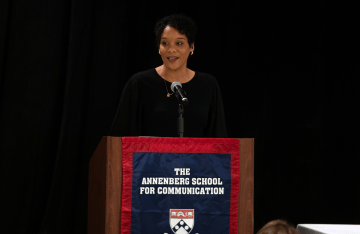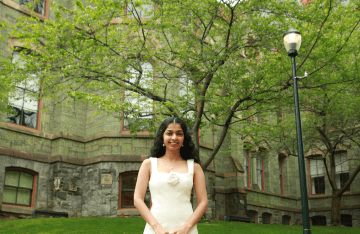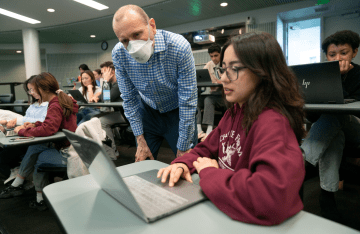Annenberg Undergraduates Attend Republican and Democratic National Conventions
This marks the fifth presidential election cycle for which David Eisenhower has led students to the nominating conventions.
A national political convention in America is quite a thing to behold. For four nights, nearly every major politician in a given party is in one arena, along with every news outlet and its top journalists, thousands of delegates, a smattering of celebrities, and countless volunteers and political professionals making the whole thing run smoothly. The speeches, the signs, the balloons, the video, the lights — it is political pageantry at the highest level.
What better classroom could there possibly be to study political communication?
That was the thinking when the Annenberg School for Communication sent its first groups of students to the 2000 Democratic National Convention in Los Angeles and Republican National Convention in Philadelphia. They have been at every national DNC and RNC convention since — 2004, 2008, 2012, and 2016 — led each time by professors who themselves are experts in the American political landscape, David Eisenhower and Marjorie Margolies.
In 2004, Annenberg established the experience as an official undergraduate course, the likes of which is completely unique in higher education: COMM 482: Conventions, Debates, and Campaigns. The course begins by students attending the conventions, continues into the fall with classroom discussions and group papers, and culminates on election night.
Eisenhower, a presidential historian and Director of the Institute for Public Service at Annenberg, is the grandson of President Dwight Eisenhower and the naming inspiration for presidential retreat Camp David. He is also married to Julie Nixon Eisenhower, daughter of President Richard Nixon. Margolies, the founder and chair of Women’s Campaign International, served in the House of Representatives from 1993-95. One of her sons, Marc Mezvinsky, is married to Chelsea Clinton.
Their contacts are part of the course’s secret sauce, a kind of semi-planned serendipity that enables students to meet and chat with famous figures in politics and media.
In addition to attending the official convention each night — with speeches that begin hours before the prime time TV cameras begin following — the students spend most of each day circulating among the countless events, meetings, and parties that fill a city during a convention.
“You have events happening everywhere — four or five major news outlets offering open houses at any given time where they bring in somebody prominent to carry on a conversation in public,” explains Eisenhower. “Conventions are exhausting. What you find is that your appetite greatly outstrips your ability to actually do things. You’ll see seven to 10 things you want to do, and you’ll be able to do three.”
At both the Republican National Convention in Cleveland this year, and the Democratic National Convention in Philadelphia, Eisenhower and Margolies gave their students a list of possible events to attend, ranging from California and Pennsylvania delegation breakfasts — Margolies was a PA delegate — to events run by Bloomberg, the Washington Post, Politico, and academic or non-profit groups like Harvard’s Institute of Politics, the Sunnylands Trust, and more.
“When you’re having an experience that intense, it’s useful to then reflect on it throughout the fall term and see it in a wider context,” says Eisenhower. “[The students] approach everything — analysis of the convention and the election — with an entirely new perspective.”
Eisenhower credits the 1968 Republican convention in Miami as having a profound influence on his life. He chuckles that as a young person, his disinterest in politics was a continual disappointment to debate teams and Republican clubs. “The 1968 convention was the most astounding 2-3 days I’ve ever spent,” he says. “The second half of my college career was influenced by that.”
Eisenhower believes that in the five groups of students who have taken the course, at least a handful have shared his sense of wonderment and altered their career plans toward public service or politics.
At the very least, there have been some memorable moments, often more so in hindsight. In 2004, the group walked into a senate candidates’ breakfast and bumped into Barack Obama, who at the time was a state senator running for U.S. Senate. He spent time talking to the Annenberg group, and flew somewhat under the radar of the room. “That night, he gave a great keynote address and walked into the pages of history,” says Eisenhower.
To see more about the course, view our video here. COMM 428 will be offered next in Fall 2020.



